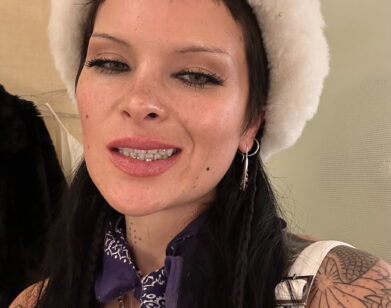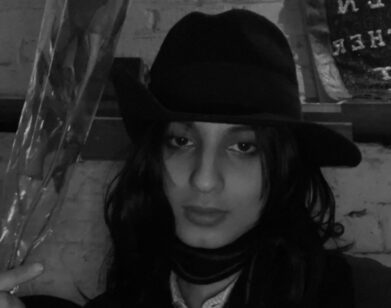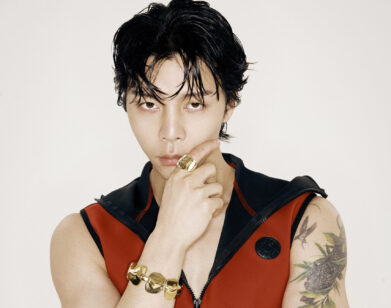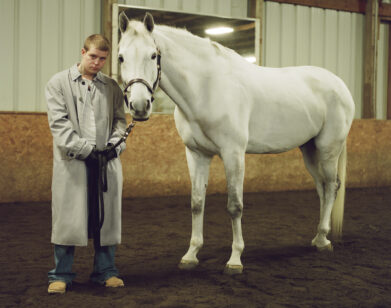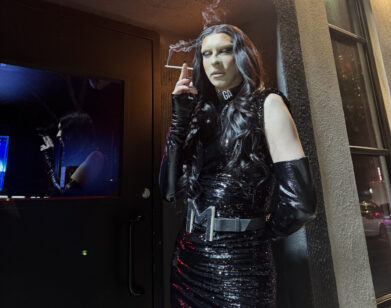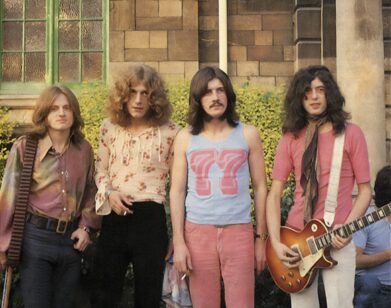Kelly Pratt Finds Bright Moments Everywhere He Goes
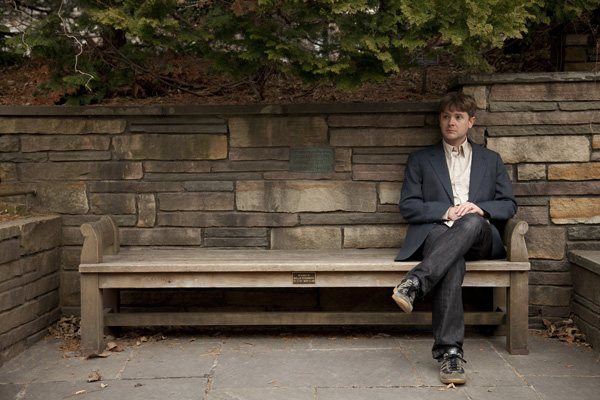
ABOVE: KELLY PRATT
During a break from touring with Beirut in the fall of 2010, New York-based brass player Kelly Pratt began writing songs for what would become the basis of his solo debut Natives (Luaka Bop), out February 21. Playing under the name Bright Moments—a nod to Rahsaan Roland Kirk’s titular 1973 live album—Pratt recorded Natives in his home studio, layering pieces bit by bit to form the album’s 10 tracks. Anchored by a true tramp’s sensibility—he’s been on the road with Beirut, Arcade Fire, and his last band, Team B, not to mention journeyman sessions work for the likes of David Byrne, Coldplay and St. Vincent—the new songs lament the monotony of the touring musician’s life (with track titles such as “Tourists,” “Travelers,” “Traveling Light,” and “Drifters”) while highlighting the splendor of the road’s native sounds, from New Orleans jazz to Harlem be-bop. Lyrically, Pratt is equally diverse: the story of the first woman to be cured of rabies provides the foundation for the accordion-driven narrative of “Milwaukee,” while an obscure book of Scandinavian poetry insinuates itself onto the whistling rambler “The Sailor.” Readying himself for SXSW and some New York showcases (including a CD release party at Cameo Gallery on February 23) with his band—Jon Natchez, woodwinds; Jared van Fleet, keyboard; Nikhil Yerawadekar, guitar; Tony Afro, drums—Pratt took some time from a recent recording session with Passion Pit to discuss his vagabonding new sound.
MICHAEL SLENSKE: So you’re in the studio today?
KELLY PRATT: Yeah, with Passion Pit. They’re finishing the new album, and I think this is one of the last things they’re doing. I’m just playing horns with Jon Natchez, who is also in Bright Moments. We do this quite a bit. We play with a band—he’ll do all the woodwinds, I’ll do all the brass. I’m playing horns on it today.
SLENSKE: So explain Bright Moments to me.
PRATT: Well, I did all of the songs and all of the arrangements, but there’s a live band. I play most of the stuff except drums, which I can’t really play, and guitar and bass. But all the horns, synth and keyboard I did on my own.

SLENSKE: It seems like this is pretty homegrown. What got you going in this direction?
PRATT: You know, I had some time off and this was my opportunity to work on my own music, and I just started writing songs in my house over several months, and then just took it into the studio and recorded it. It is very much homegrown, just written in my apartment during breaks from tours.
SLENSKE: It’s funny, because the album is called Natives, but the sound and lyrics seem inspired by this notion of traveling around the world, to point where it almost seems as if each track were recorded in different cities.
PRATT: That’s kind of the vibe I was going for. I have a really wide, diverse taste in music, and an appreciation of many different styles of music, so I think that comes out a bit. The last five years of my life have been spent very, very much on the road touring, so lyrically a lot of the album is about being away from home in a different city every day. It’s about the joys and not-joys of that.
SLENSKE: What were you going for with the sounds of “Tourists”?
PRATT: I was listening to a lot of 8-bit music, and that’s where the beginning of the song came from. I just had this piano and percussion idea, and it basically started with that, then I just layered and layered and put a lot of effects on the horns like distortion and delay, which I don’t typically do. Lyrically, it’s about not knowing what’s going on in peoples’ lives around you, and the unsureness of things, and not asking the right questions.
SLENSKE: How is that different from “Travelers”?
PRATT: Well, that’s definitely about being on tour and how it’s not quite as exciting as everyone thinks it may be and not as rewarding as everyone thinks it may be. You have your day lined out every day, then you play, go to sleep, and it’s fun sometimes but it gets old. The main instrument is a cavaquinho, which is a Brazilian guitar and I was listening to a lot of Brazilian music and it’s a bit New Orleans-y with brass. I intentionally learned the cavaquinho for this song. My friend and I were at a show and I just picked it up and started playing around on it. That’s basically how the song was born, then I just build, build, build and layer, layer, layer until it’s ready for the studio.
SLENSKE: You’ve also got some interesting source material for the lyrics on “Milwaukee” and “The Sailor,” too.
PRATT: Yeah, there’s a couple things. Most of it is pretty original, but for the last song on the album (“The Sailor”) I took a bit of this old Scandinavian poem about a guy who is about to die from consumption from traveling too much. And then “Milwaukee” is about this girl who contracted rabies through a rat bite and she’s the first person to ever have full-blown rabies and be cured of it. Protocol was the name of the treatment used to cure rabies. It was sort of coming from the position of her fake boyfriend, in a way. There’s a lot of diverse inspirations for lyrics.
SLENSKE: You’ve got a lot of sounds too. It’s like minstrel-y, carnival stuff to soul to New Orleans brass band. Is that directly from being in these places?
PRATT: Yeah, it’s definitely part of that, being in all these different places around the world and listening to different music. In my heart, I’m a brass player and have been all my life, so brass in a lot of ways is key to most of the songs, but I like different sounds a lot so I like using different synthesizers, different software, just trying to come up with unique sounds.
SLENSKE: What music got you into playing?
PRATT: When I was starting to play for real in college I was listening to jazz almost exclusively, for like four years. Maybe even longer. Jazz is the music I’ve listened to the most, sort of the hard-bop, post-bebop era. A lot of free jazz, too, mostly ’60s and ’70s jazz. American for sure. The name of the band is actually from a Rahsaan Roland Kirk album, so he has been a huge influence on me, and John Coltrane has been a big influence, Clifford Brown is another one.
SLENSKE: Is Bright Moments your favorite album?
PRATT: Not really; I just liked his concept that you have to look past all the shitty things in life and just sort of focus on the good stuff.
SLENSKE: It seems that playing with the bands you play with, who have such distinctive sounds, it could be easy for their sounds to creep into your music. But I don’t think that’s happening here. Were you making a conscious effort on that front?
PRATT: It’s not really a conscious decision, it’s more just the way I write and the way I hear music.
SLENSKE: Does that come from hearing things differently as a brass player?
PRATT: That’s absolutely true. I have a different approach to writing songs than, say, a guitar or bass player would. Being a brass instrumentalist, you’re required to think about music in a much different way. A lot of it is more about sweetening things and making things more interesting rather than being the main part of a song.
SLENSKE: Like the difference between the topping and foundation of a cake.
PRATT: Right, thinking about music in this way you have to make the songs more interesting instead of creating a foundation, and that figures into my songwriting because I try to make it interesting rather than just something straight ahead.
SLENSKE: And you’re getting ready to tour?
PRATT: Yeah, I’m actually no longer in Beirut because I want to focus on this band. I’m going to try to tour as much as I can. Hopefully after SXSW I’ll get to tour more because this big Beirut tour finally ended, so I’m finally now free.
SLENSKE: Have you played out at all?
PRATT: We’ve played a couple shows, but we’re really just getting started. We’ve have a show next week, then we’ll head down to South By and play a few shows down there.
SLENSKE: Is it easy to replicate all those layers of sound onstage?
PRATT: It’s a challenge, and you have to think differently when you’re trying to translate the whole concept, but the songs are essentially the same, you just have to be a little creative in how you replicate all the sounds. It’s obviously not a standard rock band, it’s a five-piece, and we’ve got several keyboards and stuff, but we try to keep it simple.
BRIGHT MOMENTS’ NATIVES IS OUT FEBRUARY 21. FOR MORE ON THE PROJECT, VISIT PRATT’S WEBSITE.

